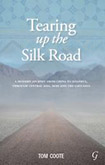Complicated Crime and Punishment in Colombia
Story and photos by Tom Coote
Crime is way down in Colombia since the Pablo Escobar coke cartel days, but there's still an uneasy relationship with the police and an uncomfortable reverence for the slain kingpin.

Lost and confused, I lowered my head as they escorted me into the back of the Colombian police van. As they drove me up through the winding, one-way streets of Bogota's bohemian Candelaria district, I recognized much of the area's revered graffiti but failed to locate myself amongst the equally prominent scrawls of anonymous tagging. The crudely spray-painted monikers would soon be whitewashed over, leaving behind just the images that aspired to some kind of permanence though artistic merit: only those judged to be the brightest and the best would be permitted to leave their mark on this landscape.
Two other guests sat smoking on the outside step of the Fernweh Photography Hostel. They looked up in concern as the police van rumbled the wrong way up the cobbled one-way street, and I stepped down onto the cracked pavement. Having shaken hands with both the policeman, and thanked them, I then explained to my roommates how the police had offered to give me a lift from the metro station-really more of an enclosed bus lane-when I had been unable to find a taxi on the empty streets outside. Apparently that part of town was far too dangerous to walk in at night.
Less than 24 hours later I stood in the basement of the Bogota Police Headquarters, looking at a collection of guns. My friendly guide, Jonathan, was a teenage shaven-headed police conscript with braces on his teeth. When I asked him about how he felt about being forced into such a perilous occupation, I was surprised to find out that he loved it and intended to join the force as a permanent recruit. The galaxies of silver stars sparkling around the police headquarters-each one indicating a hundred murdered policemen-in no way diminished either his enthusiasm or commitment. "It used to be a very dangerous job," he admitted, "but it is better now."

The Most Famous Drug King
At the peak of his powers, in the 1980s and early 1990s, the notorious drug lord Pablo Escobar would pay out a generous bonus to every one of his men who shot dead a policeman. It all became very profitable. Within the basement of the police headquarters, the collection of glass encased exhibits dedicated to Escobar—everything from murder weapons, to a gold embossed Harley Davidson, to the two-way radio that was supposedly used to track him down-resembled something all too similar to a shrine; a shrine to power and money. Despite his commitment to the other side—or perhaps because of it—Jonathan seemed to almost revere these icons of criminality.
Pablo Escobar quite consciously cultivated the mythology of a modern-day messiah. He achieved a reputation for helping the poor, for standing up against corrupt Colombian authorities, and being tough but fair. This is more than could be said for many of the other competing armed groups in Colombia at the time. When the world famous kingpin was finally caught and killed, over 25,000 attended his funeral. "Being a policeman can be a tough job," said Jonathan "as both the criminals and the public will often hate you."

Escobar-themed day tours are becoming increasingly popular in Colombia, especially around his home city of Medellin. One of the more expensive ones even offers the opportunity for tourists to meet, shake hands, and take selfies with his brother. The popularity of such fun days out with everyone from gap-year backpackers, to winter-fleeing baby boomers, is a cause for concern for many modern Colombians who feel that there is a real danger of glamorizing a murderous psychopath who set back the development of their country by decades. Objectors refuse to acknowledge him even by name, referring to him as only "the criminal."
Upstairs in the grand colonial main hall of the police headquarters stood lines of near identical shaven-headed teenage police cadets, dressed up in badly fitting suits that looked like they had been borrowed from older relatives. A man in a more important looking uniform, who was reading a speech, glared at us. I was talking too loudly during their graduation ceremony. Jonathan explained that all the new recruits would be required to swear loyalty to both the Colombian State and the Catholic Church. There could be no exceptions.
Copyright (C) Perceptive Travel 2016. All rights reserved.
- Reliving an Abandoned Town on the Patagonian Coast by Madelaine Triebe
- Celebrating The Food of Portugal by Thomas Swick
- World Music Reviews
- Travel Book Reviews
Books from the Author:

Buy Tearing up the Silk Road at your local bookstore, or get it online here:
Amazon US
Amazon Canada
Amazon UK
Kobo

Buy Voodoo, Slaves and White Man's Graves at your local bookstore, or get it online here:
Amazon US
Amazon Canada
Amazon UK

